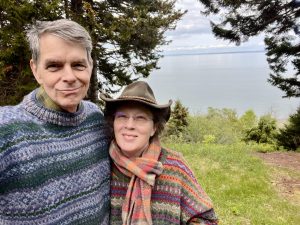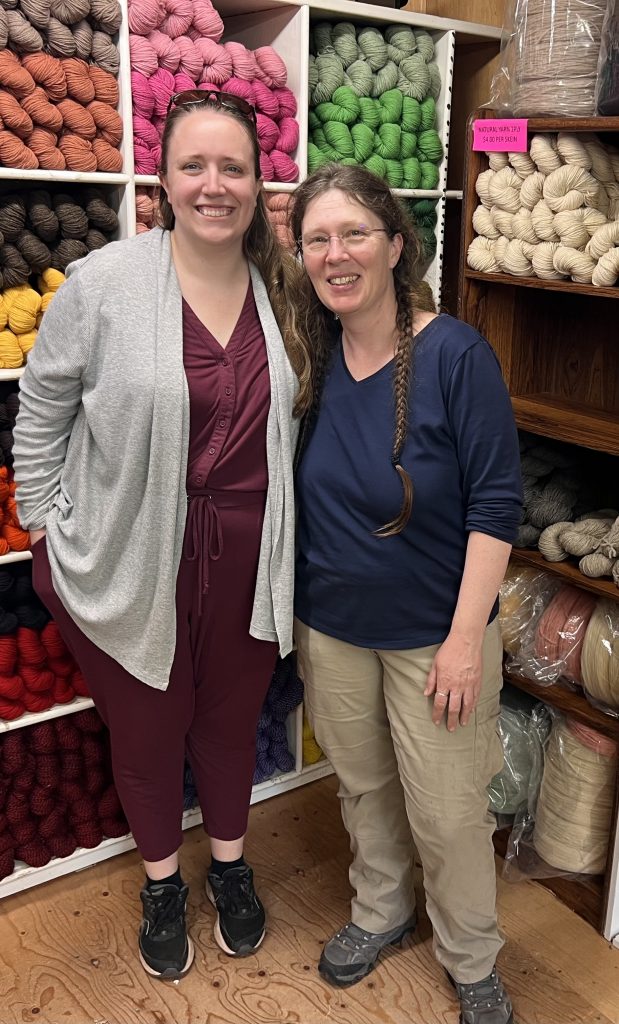I’d seen plenty of yarn in my life, but I never wanted to be a knitter until I stood in MacAusland’s Woolen Mill in Prince Edward Island. That was the first time I’d laid my hands on a wool blanket or a skein of yarn and felt the same lanolin that I felt in our shorn fleeces back home.
Lanolin is a wax secreted by the sebaceous glands of sheep. It coats their wool, which then protects them from the elements. I’d had plenty of wool sweaters, and I’d seen lots of wool yarn and blankets in my life, but it was all scratchy. The lanolin had been stripped from the fiber. But this yarn felt like butter in my hands. The blankets were the softest I’d ever felt.
I was barely out of college when mom and I made our first trip up. She had scoured the continent, searching for a mill that would take our fleeces and make blankets for us. The wool crop on the farm had become a problem. Sheep farmers can sell their fleeces at regional wool pools, where the crop is weighed and graded and awarded a commodity price….Typically less than what was paid during the Civil War, without even adjusting for inflation. Selling wool on the commodity market doesn’t cover the cost of shearing or the gas to drive to the wool pool. A farmer is lucky if it covers the cost of the satchels for bagging the wool. A lot of farmers cut their losses and simply throw it out, or switch to hairless breeds, rather than try to recover their costs through a sale.
Mom wanted to figure out a better way. She felt that if she could find a mill that would process the wool into blankets, she could sell them directly to our customers. And nearly thirty years ago that led her and me to MacAusland’s woolen mill, an unassuming building with floors oiled by years of lanolin on the western side of the Prince Edward Island. Allan MacAusland was running the family business when Mom and I brought that first load up. We worked with him for years before his nephew Dale MacAusland stepped in. During that time, I started taking a few skeins of their yarn home with me each time we dropped off the wool. My fingers grew addicted to the feel of the lanolin-coated fiber. The wool sweaters I made from it were soft and pliable, but stood up to rain and wind. They became our most-used articles of clothing, year-round. The lanolin protected us from nearly everything Mother Nature could throw at us.
Before long, recognizing my love for the blankets and the yarn, Mom and Dad transferred the wool business over to me. Soon, each time we delivered a load of fleeces, I was bringing back bales of yarn to sell to our customers along with the blankets. And while Dale stood at the counter to help me, his daughter Monica, recently out of college, stood beside him, softening her father’s cranky old Scottish ways.
The trip to MacAuslands then became an annual pilgrimage for Bob and me, driving a truckload of fleeces up the coast, listening to audiobooks during the day, camping each night, my fingers working MacAuslands wool into sweaters as we rolled along. As I stood in the mill office each year, I’d roam around staring at the walls, looking at the pictures from when the family first started it in 1870, studying the faces of the employees who served the mill, the family members in succession, keeping this tiny business in operation generation after generation. What I saw on those walls was truly inspirational. That’s what I wanted for Sap Bush Hollow: Family members, generation after generation, keeping a business going, supported by the business, and supporting each other.
And then the pandemic hit and the border closed.
And then Dale passed away unexpectedly. Monica was forced to step to the helm before she was ready.
They probably never knew how attached I had become to their story, but down here in New York, I worried for them all. Monica was living one of my worst nightmares.
Like MacAuslands, Sap Bush is operated by a bunch of cranky independent thinkers. We each do our own thing, we do it well enough, and we come together to run a business with our separate skillsets and difficult personalities. Mom deals with the egg production. Dad manages the livestock and pastures while Ula and Saoirse assist. Bob and I share the operations, he oversees the buildings, and I handle the business and marketing. Saoirse, Ula and I work directly with the customers. Since I am at the helm, I daily worry about everything I don’t know about what everyone else is doing. I run scenarios in my mind about how to fill in the gaps — who will manage the egg business if something happens to Mom? How do I get a handle on all the livestock production information that swims around in Dad’s head? Which circuits do I flip when the power goes out in the cafe kitchen if Bob isn’t around to fix it? How will I manage any of this when these people are my best friends, the joys of my life, and their absence would plunge me into despair?
How many unknowns were dropped into Monica’s lap with her Dad’s sudden passing? How did she grapple with them while coping with her loss?
What is the future of this family business that my own family business has come to rely upon?
With the border closings these past few years, we learned it was cheaper to ship the wool up to the mill. But there was too much weighing on my mind about MacAuslands. I wanted to see the mill myself. I wanted to talk to Monica. I needed to talk to Monica. I needed to understand that a person can endure pain, and still hold together a family legacy like that mill.
And so we load up the tent, the cook kit, the sleeping bags and the fleeces. I put my knitting basket in the passenger seat, Bob hops in the drivers’ side, we download an audiobook, and we set off up the coast, driving all day, picnicking on the side of the road, buffering ourselves from the cold in our wool sweaters as we sip cocktails on the edge of the Atlantic outside our tent in the evening, until we get to the mill once more.

And there stands the same old equipment, the wood floors worn and polished by footsteps and fleeces, and the same employees sitting out front at a picnic table taking their lunch. Monica is up in the office helping an assistant pack up the bales of yarn. She has blanket colors ready to show me in between a steady flow of customers coming and going.
I pull up a chair and sit down for a spell just to watch. I need to be there, to take it all in. Between customers, we talk about what these past few years have been like. Her eyes grow moist as she talks about the planning she and her dad had begun, but never got to finish. She rues the lack of preparation that she had because of his sudden passing.
“I don’t believe I’ll ever know enough to be prepared to keep the business running if I lose someone,” I confess.
“Well. I’ll tell you what I learned,” she says. “You go through their browser history after they die, and you find out they were winging it just like us. Dad had a million and one YouTube videos that he was using to help him figure out how to keep the boiler running. He always seemed like he knew what he was doing. But he was figuring it out as he went along, too.”
“And you have support through all this?” I ask.
“Of course!” She exclaimed. “I have my mother, my uncle, my sister, my cousin…” Her list of support goes on. “I’m not alone in this.”
Lanolin! I think. Of course! This business is rich in lanolin! That’s what family brings to it. Family becomes that protective coating that buffers us from the elements. It loves us even when we make mistakes, protects us while we learn and keep going.
And listening to her, I think about all that I have – an Aunt and Uncle who know the business, kids who know more about farm operations than I do, employees who care about this place as much as I do, dedicated parents and husband, nieces and a nephew who love to be here, siblings and in-laws who want to make sure we continue. Everyone is imperfect, but everyone is rich in the love and forgiveness needed to form the protective layer of lanolin. I have to remember that. There’s no reason to fear the future. Only experience it. And keep producing lanolin.
Did you enjoy this? Please take a few minutes to leave a review. This helps other folks find my work. And please share this podcast with friends & family. This really helps to get the ideas to spread. Better still, you can help make the magic happen for as little as $1/month by hopping over to Patreon and looking up Shannon Hayes. Or, if it’s easier, you can also donate to support the podcast by sending a check to Shannon Hayes, ℅ Sap Bush Hollow Farm, 832 W. Fulton Rd, West Fulton, NY 12194.
And that’s a really important thing to do, because all of this— the podcast, the blog, the novels and books and the creative recharging that happens over fall and winter— are a result of the support of my patrons on Patreon. And this week I’d like to send a shout out to my patrons Judy Stavisky & Joyce Dicks. Thank you, folks! I couldn’t do it without you!
